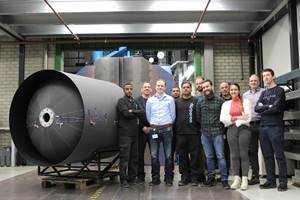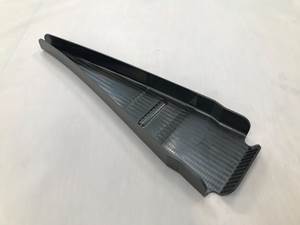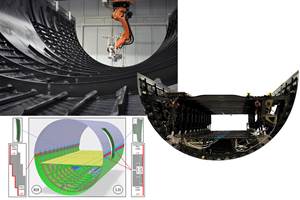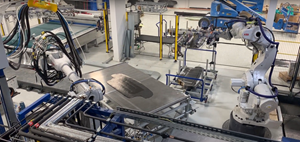Plataine wins Frost & Sullivan Global Technology Innovation Leadership Award
Plataine’s cloud-based digital assistants leverage AI to automate and optimize critical composites manufacturing flows, increase operational resiliency and push the envelope towards zero-waste manufacturing.
Share
Read Next

Photo Credit: Shutterstock
Research and consulting firm Frost & Sullivan (San Antonio, Texas, U.S.) has recognized Plataine (Waltham, Mass., U.S.) with the 2021 Global Technology Innovation Leadership Award for optimizing production in zero-waste manufacturing. Each year, Frost & Sullivan presents this award to the company that has developed a product with innovative features and functionality that is gaining rapid acceptance in the market. The award recognizes the quality of the solution and the customer value enhancements it enables.
Plataine’s context-aware digital assistants geared toward the composites industry are reported to maintain business continuity and improve agility and responsiveness to market disruptions; they were created especially for time-sensitive materials for composites prepregs management and traceability. The digital assistants optimize key manufacturing decision flows such as production scheduling, materials and tools management, then track actual progress and proactively adjust for demand variability, changeovers and downtimes, defects and recalls in order to optimize production. Plataine’s intelligent digital assistants make predicting and reassigning raw materials, machines and assets in factories possible.
This capability has become even more vital as industrial supply chains struggle to cope with the effects of the COVID-19 pandemic, Plataine notes, resulting in unstable production demand, supply chain disruptions and unexpected employee presence on the production floor given local lockdowns or personal quarantines. Plataine’s digital assistants for manufacturing address the complexity of current-day manufacturing, which requires consideration of multiple factors, constraints and dependencies between production operations, materials, tools, machines and personnel.
To address these complexities and challenges, Plataine has combined the capabilities of Artificial Intelligence (AI), industrial IoT (IIoT), edge computing and context-aware intelligent software in a suite of digital assistants, deployed on secure cloud servers. By integrating with a company’s ERP backbone, MES and PLM systems, Plataine’s intelligent digital assistants receive production demand, customer requirements, order quantities and due dates to set boundary conditions and analyze real-time data gathered from machines and sensors on the production floor. The digital assistants then generate optimized production plans to maximize material yield, equipment effectiveness and waste reduction as well as recommendations on best available material choices and coordinated maintenance plans for tools and other assets.
According to Frost & Sullivan senior industry analyst Isaac Premsingh, “Plataine’s market-leading technology combines proprietary AI-enabled scheduling algorithms and searchable digital threads to arm factory managers and operators with the flexibility required to make optimized decisions in real time in a complex, dynamic manufacturing environment.”
Plataine’s newly announced Practimum-Optimum algorithm represents a further paradigm shift in production optimization, integrating machine learning (ML) and optimization-search capabilities to create a self-learning system that not only pursued optimal production KPIs, but also practical production plans that consider all facets of the production plan and are robust to execute. “The path to zero-waste manufacturing requires integrating software solutions to help manufacturers meet deadlines, ensure product quality and remain competitive,” explains Premsingh. “Plataine’s context-aware digital assistants that constantly interact with factory assets to augment decision-making processes at the enterprise level are key to achieving factory-level optimum in three critical areas: scheduling, quality and utilization of material and resources.”
Frost & Sullivan commends Plataine for its resilience and agility in delivering a high-quality customer experience while navigating service delivery challenges during 2020. Plataine successfully completed remote online deployments with several new customers despite the challenging lockdown restrictions and travel bans.
Related Content
Airborne delivers composite upper stage tank for EU ENVOL project
Nine-member consortium targets development of low-cost, green vertical orbital launcher with manufacture of an ultra-lightweight composite tank design in an automated manufacturing environment.
Read MoreASCEND program update: Designing next-gen, high-rate auto and aerospace composites
GKN Aerospace, McLaren Automotive and U.K.-based partners share goals and progress aiming at high-rate, Industry 4.0-enabled, sustainable materials and processes.
Read MoreManufacturing the MFFD thermoplastic composite fuselage
Demonstrator’s upper, lower shells and assembly prove materials and new processes for lighter, cheaper and more sustainable high-rate future aircraft.
Read MoreBio-inspired EV underbody panel developed by TPI Composites, Helicoid Industries
Composite underbody panel for battery pack protection, made of stacked multiaxial noncrimp fabric, will serve high-volume commercial and automotive markets.
Read MoreRead Next
Light & Strong deploys Plataine Shelf-Life Manager for optimized, automated inventory management
AI-based software fully digitizes composite material monitoring in real-time from factory to freezer, and analyzes opportunities to use material remnants for reduced waste.
Read MoreDeveloping bonded composite repair for ships, offshore units
Bureau Veritas and industry partners issue guidelines and pave the way for certification via StrengthBond Offshore project.
Read MorePlant tour: Daher Shap’in TechCenter and composites production plant, Saint-Aignan-de-Grandlieu, France
Co-located R&D and production advance OOA thermosets, thermoplastics, welding, recycling and digital technologies for faster processing and certification of lighter, more sustainable composites.
Read More














.jpg;maxWidth=300;quality=90)








